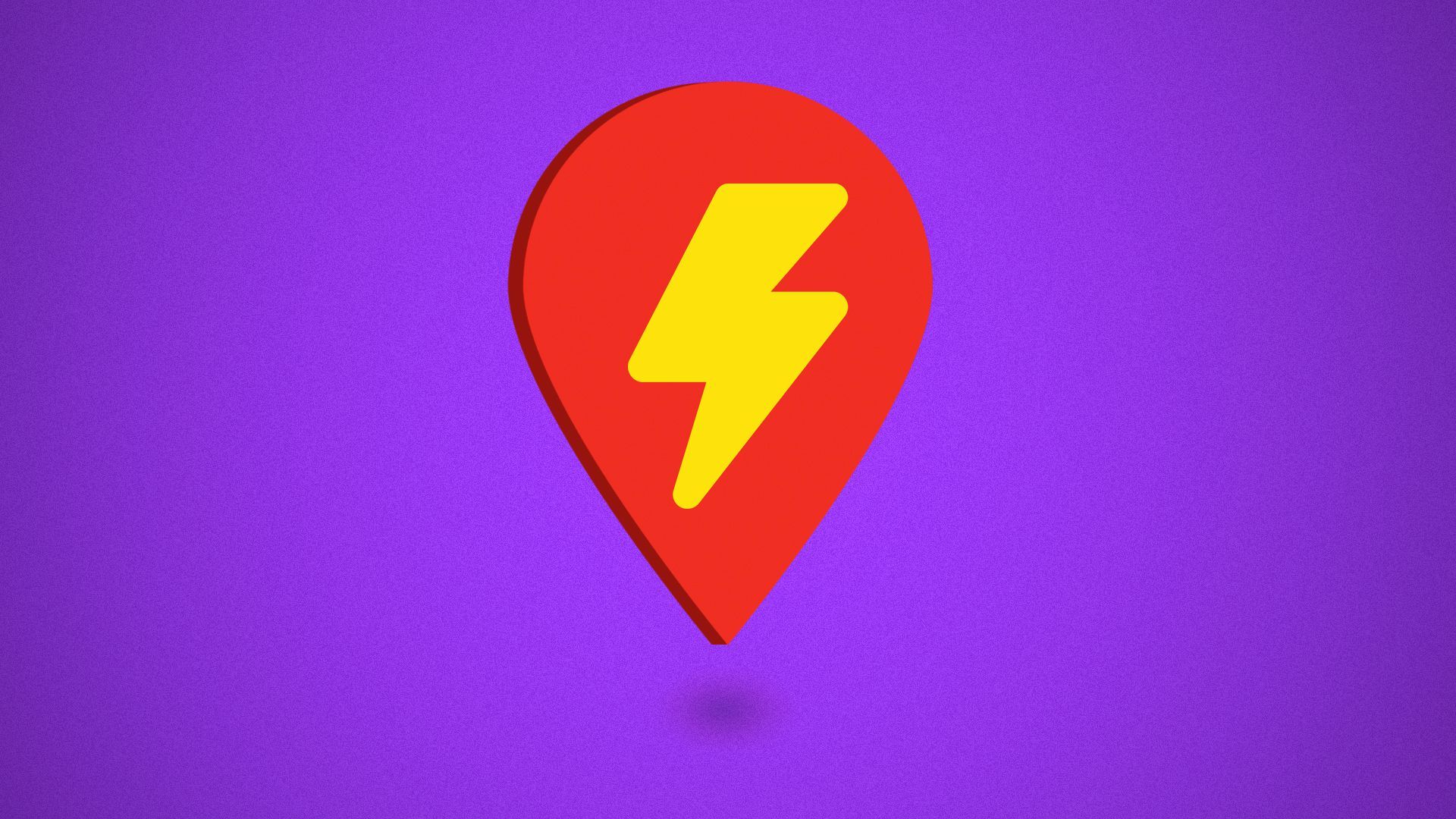| | | | | | | Presented By National Grid | | | | Axios What's Next | | By Jennifer A. Kingson and Joann Muller · Apr 19, 2022 | | Welcome back! - Did you know? You're no longer required to wear a mask on planes, trains or other public transportation. A federal judge Monday struck down the federal government mandate.
- Ideas or comments? Email us at whatsnext@axios.com.
Today's Smart Brevity count: 1,118 words ... 4 minutes. | | | | | | 1 big thing: Cities' EV charging dilemma |  | | | Illustration: Shoshana Gordon/Axios | | | | Congested cities stand to benefit the most from switching to electric vehicles, yet they often have the fewest places to charge them. As EVs become increasingly available, the plug problem is finally getting more attention. Why it matters: Transportation is the leading cause of greenhouse gas emissions in the U.S. Replacing gasoline cars with EVs could go a long way toward helping the planet. A plug-in is not an easy choice, however, for people who live in apartments or homes without a garage to charge their cars. - And curbside chargers aren't practical when on-street parking is first come, first served. Plus, many are slow "Level 2" chargers, requiring three to eight hours to fully charge an EV.
- Without widespread access to affordable fast-charging, EVs won't catch on in the places they're most needed, including low-income neighborhoods, where local air quality is typically worse.
What's happening: In New York, several mobility startups are trying to tackle the urban charging dilemma, not just for private EV owners but also for taxis, ride-hailing fleets and delivery vehicles that need to keep running. - Gravity Mobility, founded in 2021, has developed a compact, fast-charging solution for cramped parking garages. Its first 24-space, fast-charging hub will debut this spring in a garage on West 42nd Street in Manhattan.
- Revel, which rents mopeds and operates a Tesla-based ride-hailing service, opened a 25-plug fast-charging site in Brooklyn last summer.
- Beam Global has deployed 89 of its off-grid, renewable charging pads for New York's municipal fleets. Each charging unit generates and stores its own solar and wind power, without taking up valuable parking spaces.
The big picture: EVs accounted for just 3.5% of U.S. vehicle sales in 2021, according to IHS Markit. With more than 65 new plug-in models coming by 2025, however, there's a race to install charging infrastructure to keep up with the anticipated EV growth. - The federal infrastructure bill passed last November contained $7.5 billion to install hundreds of thousands more public charging stations. The focus, however, is mostly on highway corridors, not urban areas.
- Leading charging companies like Greenlots, EVgo and Electrify America tend to put banks of chargers near shopping malls and other parking lots where they are visible and easy to access.
The bottom line: For many, home remains the most convenient place to charge. Cities will need to work with developers and building owners to improve charging access for everyone. Read the rest of the story. |     | | | | | | 2. Corporate travel's slow recovery |  Data: Deloitte Consumer Industry Center; Chart: Baidi Wang/Axios Many companies had been limiting corporate travel because of health concerns and travel restrictions. Now there are new worries about the soaring cost of travel and its impact on businesses' much ballyhooed climate commitments, Joann also writes. Why it matters: Unlike leisure travel, which is now roaring back, business travel is at least two years from a full recovery, according to new research from Deloitte. Driving the news: Many companies are summoning workers back to the office after two years of remote work. - Long-delayed team meetings have been rescheduled and conferences are slowing shifting back from online to in-person events.
- All of that is likely to mean a gradual uptick in corporate travel over the remainder of 2022, according to Deloitte's annual survey of 150 corporate travel managers.
- But it will be a slow recovery. Travel spending is expected to rise from about 36% of 2019 levels in the second quarter to 55% of pre-pandemic spending by the end of the year, Deloitte says.
- Travel to Europe will bounce back close to 2019 levels, but Asia and Latin America will continue to lag far behind.
Between the lines: Companies are reassessing and reprioritizing when and why employees travel. - Many bosses are keen to maintain the financial savings and climate benefits they saw during the pandemic when employees worked from home and corporate travel was limited.
- Three in 10 companies expect sustainability concerns to lead to an 11%–25% reduction in travel budgets by 2025.
- Plus, there are risks that could depress business travel, including new COVID-19 variants and the war in Ukraine.
Share this story. |     | | | | | | 3. Doctors got a raise last year |  Data: Medscape; Table: Thomas Oide/Axios After compensation stagnated in the first year of the pandemic, doctors saw their salaries rebound by 7% by the end of last year, according to Medscape's Physician Compensation Report, Axios Vitals reports. Driving the news: The report includes financial details from about 13,000 physicians across 29 specialties and found that primary care doctors earned $260,000 on average, while specialists averaged $368,000. - Of those specialties surveyed, plastic surgery averaged the highest compensation at $576,000, while public health and preventative medicine ranked lowest at $243,000.
|     | | | | | | A message from National Grid | | There is a better way to a fossil-free energy future | | |  | | | | National Grid is announcing our path to a completely fossil-free energy future. By using green hydrogen and renewable natural gas, we can achieve a fossil-free network by the year 2050. There is a better way to keep energy affordable, reliable, and clean. See how. | | | | | | 4. We're drowning in spam |  It's not just you: The overall number of spam calls, texts and emails has exploded, Axios' Margaret Harding McGill and Sara Fischer write. Why it matters: Junk messages aren't just annoying. They open the door to more fraud, cybercrime and identity theft than ever before. Driving the news: The average American received roughly 42 spam texts just in the month of March, according to new data from RoboKiller, an app that blocks spam calls and texts. - Spammers like using text messages because of their high open rates — and are now even mimicking targets' own phone numbers to get them to click on malicious links, the New York Times reported.
It's not just texts. Every form of spam is on the rise. - There were more spam calls last month than in any of the previous six months, per YouMail's Robocall Index.
- Spam emails rose by 30% from 2020 to 2021, according to a January report from the Washington Post.
Be smart: The federal government has easy-to-digest guides on how to dodge spam calls and texts. |     | | | | | | 5. Playdate: a Gameboy throwback |  | | | Playdate video gaming device. Photo courtesy of Panic | | | | The brand-new Playdate portable gaming device has more going for it than a striking yellow color scheme and a crank you can use to control some of its games, Stephen Totilo, co-author of Axios Gaming writes. Driving the news: The Playdate is a mix of retro and modern with a clutch of unexpectedly pleasing games. - It's also in short supply. The first wave of devices shipped Monday, according to its designers at Panic.
- But anyone who preorders one of the $179 machines now won't get theirs until next year.
The details: The Playdate is a tiny block of plastic about 3 inches square, with a monochromatic screen that harkens back to Nintendo's original Game Boy. - It has buttons and a crank, the latter used in some of Playdate's first wave of games for stirring potions, swinging a sword, rotating a surfboard and, in at least two games, turning back time.
- But the system's most novel idea is its initial seasonal approach to game releases, doling out two new games a week — and at least one surprise — for 12 weeks, starting the moment an owner first connects the system online.
|     | | | | | | A message from National Grid | | There is a better way to a fossil-free energy future | | |  | | | | National Grid is announcing our path to a completely fossil-free energy future. By using green hydrogen and renewable natural gas, we can achieve a fossil-free network by the year 2050. There is a better way to keep energy affordable, reliable, and clean. See how. | | | | Was this email forwarded to you? Get your daily dose of What's Next magic by signing up for our free newsletter here. |  | It's called Smart Brevity®. Over 200 orgs use it — in a tool called Axios HQ — to drive productivity with clearer workplace communications. | | | | | | Axios thanks our partners for supporting our newsletters. If you're interested in advertising, learn more here.
Sponsorship has no influence on editorial content. Axios, 3100 Clarendon Blvd, Suite 1300, Arlington VA 22201 | | | You received this email because you signed up for newsletters from Axios.
Change your preferences or unsubscribe here. | | | Was this email forwarded to you?
Sign up now to get Axios in your inbox. | | | | Follow Axios on social media:    | | | | | |









No comments:
Post a Comment